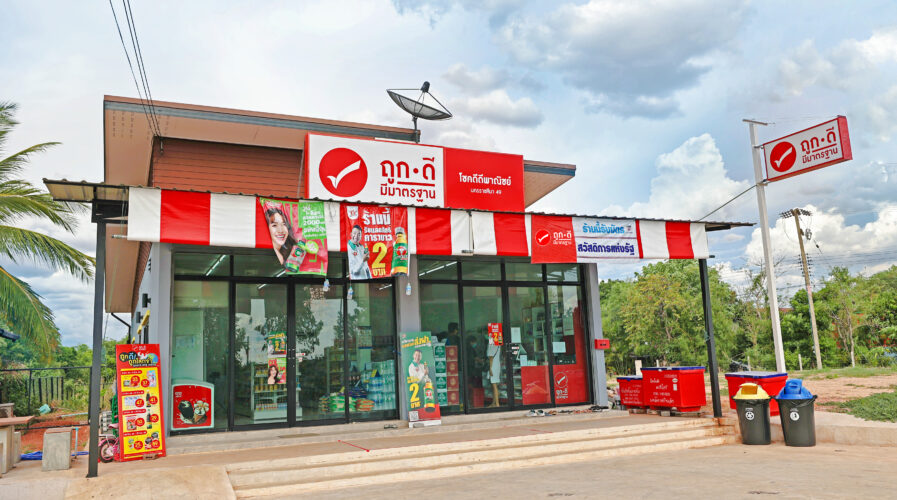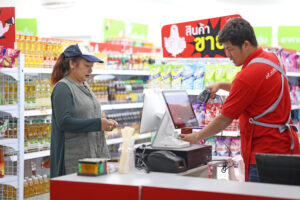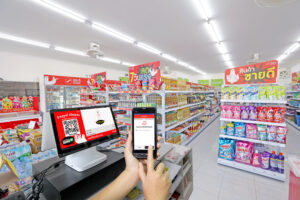
Tookdee Store in Rural Area (Source – Google)
Google Cloud and TD Tawandang democratize analytics and AI for Thailand’s mom-and-pop stores
Before the rise of e-commerce and big retail giants in Thailand, shohuays or mom-and-pop stores have traditionally been local communities’ retailers of choice for groceries and other daily essentials at affordable prices. These small stores continue to play an important role, contributing a significant amount to Thailand’s GDP.
However, most of these stores have now been overshadowed by fast-expanding convenience store chains that offer lower price points due to economies of scale. At the same time, the pandemic has also led to most of these stores shutting down and being unable to cope with new challenges brought upon by e-commerce. This has led to 61.6% of local micro, small, and medium enterprises (MSMEs) experiencing a decline in income.
One of the biggest challenges faced by mom-and-pop stores is limited product visibility and difficulty matching demand and supply. As these stores are small, most of them do not overstock. Oftentimes, their profit margins are eroded by perishables expiring before they can be sold. They also end up having unhappy customers with unmet needs when desired items are not replenished quickly enough.
At the same time, many mom-and-pop stores are also located in rural areas with intermittent internet connectivity. This makes it harder for them to even adopt new technologies or leverage e-commerce services to cater to their customers.
To keep these stores going, they would require to transform and elevate their competitiveness. Unfortunately, most of them do not have the funding nor the skills to digitally transform or even upgrade their services.
A new hope

Tookdee Store owner serving customer. (Source – Google)
Fortunately, there is still hope for shohuays. TD Tawandang (TD), a leading retail technology company, is collaborating with Google Cloud to help conventional mom-and-pop stores reinvent their business operations, overcome competitive challenges, and boost profitability.
As funding is a concern, TD offers a profit-sharing partnership model, gives its stores a visual makeover, and provides them with access to its unified TD Retail Platform. The platform is built entirely on Google Cloud’s secure and scalable infrastructure, and advanced analytics, artificial intelligence (AI), and machine learning (ML) technologies.
The platform includes a smart point of sale (POS) application connected to a full retail distribution network. TD automates stock replenishments and financial accounting on the store’s behalf. Instead of closing their stores to visit wholesalers and manually recording sales transactions, store owners can focus on other tasks like receiving goods, printing out price tags and promotional messages from the smart POS, restocking shelves, and building relationships with their customers.
“At the heart of every village and province lies mom-and-pop stores that have befriended their customers and served their communities for years, but many have struggled lately to make ends meet. We’re also seeing individuals who lost employment during the pandemic return to their hometowns and open small retail shops to earn a baseline income,” said Tientham Setthasit, Executive Director, TD Tawandang.
Setthasit explained that by tapping Google Cloud’s industry-leading technologies and expertise, they have designed an integrated platform that nearly 4,000 micro-retailers have been using in the past three years to more than double their daily incomes while retaining full ownership of their stores and 85% of profits. With more than 100 micro-retailers now joining the Tookdee network each week, he added that TD will continue collaborating with Google Cloud to scale reliably, enhance the platform, and deliver more value-added services.
To address the challenges, Google Cloud’s Dataplex helps facilitate data flows between POS applications and a centralized, cloud-based enterprise resource planning (ERP) system. TD and store owners can track products sold and gain real-time visibility over their earnings and available inventory. TD then uses Google Cloud’s tools to help its retail distribution teams forecast demand and schedule deliveries for just-in-time stock replenishments.
For connectivity, TD can give store owners a smooth and reliable user experience across its cloud-connected applications by leveraging Google Cloud’s capabilities. These include the POS software at in-store terminals and communications services on handheld devices. In addition, these capabilities allow the applications to work offline to minimize disruptions to store operations, while newly generated data is automatically synchronized across systems once connectivity is restored.
“The applications we provide to micro-retailers, while easy-to-use on the frontend, are underpinned by numerous processes on the backend. All of these also produce terabytes of data on a daily basis, which must be effectively organized and ingested for the TD Retail Platform to benefit store owners as intended,” commented Ruud Akarapanitsakul, Chief Technology Officer, TD Tawandang.
Innovations in store for mom-and pop-stores

Tookdee Store POS Terminal and Application (Source – Google)
With its robust architecture firmly in place, TD has accelerated its pace of innovation. Through new self-service kiosks that further transform mom-and-pop stores into “virtual hypermarts,” consumers can now access TD’s wider catalog of fast-moving consumer goods and pre-order items that are not a part of the in-store inventory, before paying upfront and returning to collect these items once they are delivered to the store. TD is also rolling out a LINE mini-app to help micro-retailers better engage with and retain customers.
“By integrating data from the mini-app onto our platform, granular insights into consumers’ purchasing behavior in each province can be derived to provide initial assortment recommendations and boost sales quicker when a store joins our network, pinpoint new items that each store should carry on a regular basis, promote local brands’ signature snacks, incentivize suppliers to run discounts due to economies of scale, and inform decisions to establish new distribution centers,” added Akarapanitsakul.
For its next phase of collaboration with Google Cloud, TD is exploring data collection from sensors that measure air temperature and humidity outside each store or track movements to different areas of the shop floor. These could help the TD Retail Platform respond to weather patterns and consumers’ seasonal needs, while product displays and store layouts can be optimized to attract customer attention and expose them to more merchandise.
“With Thailand setting this year’s Asia-Pacific Economic Cooperation agenda and spearheading conversations on MSME recovery across the region, TD can serve as a great example of how cloud, analytics, and AI technologies can be used to empower groups with untapped economic potential. We’re proud to contribute to TD’s vision for inclusive growth, and look forward to supporting the expansion of the company’s retail operations and innovations to other markets in Southeast Asia,” said April Srivikorn, Country Manager, Thailand, Google Cloud.
READ MORE
- The criticality of endpoint management in cybersecurity and operations
- Ethical AI: The renewed importance of safeguarding data and customer privacy in Generative AI applications
- How Japan balances AI-driven opportunities with cybersecurity needs
- Deploying SASE: Benchmarking your approach
- Insurance everywhere all at once: the digital transformation of the APAC insurance industry


